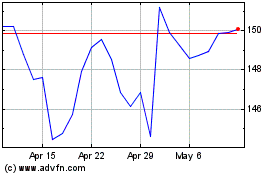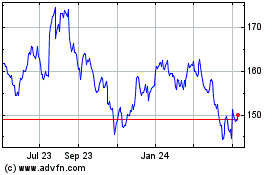By Peter Loftus
U.S. health authorities recommended a pause in the use of
Johnson & Johnson's Covid-19 vaccine in order to investigate
rare but severe cases of blood clots, a setback to vaccination
efforts racing against virus variants.
The U.S. Food and Drug Administration and the U.S. Centers for
Disease Control and Prevention announced the move Tuesday, after
finding that six women between the ages of 18 and 48 years who got
the vaccine had developed blood clots and one died. More than 6.8
million doses have been administered in the U.S., the agencies
said.
The decision prompted the U.S. government to suspend at its
vaccination sites administration of J&J's vaccine, a federal
health official said, while states and other authorities scrambled
to adjust.
The government's review may only take a few days, health
authorities said. A panel of outside experts will meet Wednesday to
review the matter for the CDC, while the FDA will also conduct an
investigation.
J&J said Tuesday it is aware of an extremely rare disorder
involving people with blood clots in combination with low platelets
in a small number of people who received its vaccine. J&J said
it is working with health authorities and medical experts.
The company also said it has decided to delay the rollout of its
vaccine in Europe, which had been planned for later this month.
White House Covid-19 coordinator Jeff Zients on Tuesday said a
recommended pause in the administration of the J&J vaccine was
"out of an abundance of caution" and won't have a major effect on
vaccination efforts.
J&J's vaccine "makes up less than 5% of the recorded shots
in arms in the United States to date," Mr. Zients said.
He also said the administration was working with state and
federal partners to get people who were scheduled to receive the
J&J shot signed up for a Pfizer or Moderna vaccine.
The halt comes at a dangerous time during the pandemic, as
health authorities race to vaccinate as many people as possible
before variants develop that can evade the shots. Among the biggest
hurdles is overcoming hesitancy to get vaccinated.
The specter of blood clots could add to concerns about the
safety of the shots, though vaccines from Pfizer Inc. and its
partner BioNTech SE and from Moderna Inc. have proven relatively
safe so far.
Pause of the J&J's vaccine use could hurt some vaccination
efforts in the U.S., especially in areas that lacked the special
freezers required to store the two-dose Pfizer-BioNTech and Moderna
shots and on college campuses that wanted to give their students
the single J&J dose.
Yet the impact could be limited because Pfizer and Moderna have
been ramping up production as they gained more experience making
the shots and expanded their manufacturing capabilities. Federal
officials expected to allocate about 26.5 million doses of the
Pfizer-BioNTech and Moderna vaccines combined this week, compared
with 1.5 million of J&J's.
The U.S. has an abundant supply of the Pfizer-BioNTech and
Moderna vaccines, a Health and Human Services Department official
said. The J&J vaccine won't be given at federally-run
vaccination sites, the official said.
Some states and vaccine providers quickly made alternative plans
in response to the call for a pause by federal health officials.
New York Gov. Andrew Cuomo tweeted that state-run mass vaccination
clinics would offer the Pfizer-BioNTech vaccine in lieu of the
J&J vaccine to people with appointments Tuesday.
Walgreens Boots Alliance Inc. said it immediately suspended
administration of J&J's vaccine at its retail pharmacies and
off-site clinics and will await further guidance. The company is
reaching out to people who had appointments to reschedule them.
Separately, Australian health officials said Tuesday the country
has decided against using J&J's shot, after a panel of
scientific experts advising the government said it shouldn't buy
any more vaccines of its type.
Johnson & Johnson's vaccine has been expected to account for
more than 15% of the European Union's second-quarter deliveries, or
55 million of 360 million expected doses, during the three months
from March through June. European health authorities have been
looking into the clotting issue. Deliveries of J&J shots to the
continent began Monday.
The EU's European Medicines Agency, which has closely analyzed
concerns about blood clots among recipients of the AstraZeneca
vaccine, is also studying clot concerns about the J&J
vaccine.
J&J's vaccine was the third authorized for use in the U.S.
It uses similar technology as a vaccine from AstraZeneca PLC and
the University of Oxford, not yet authorized in the U.S. that has
also been linked to rare cases of blood clots.
The J&J and AstraZeneca viral-vector vaccines contain a
virus that causes the common cold, but which has been rendered
harmless. That virus is engineered to include genetic instructions
that set off an immune response to protect people against the
coronavirus.
The Pfizer and Moderna vaccines use a different technology,
called messenger RNA, to achieve the same goal.
The risk of these rare types of blood clots is likely to be a
"class effect" of viral-vector vaccines, said Dr. Paul Offit,
director of the vaccine education center at Children's Hospital of
Philadelphia. He said it is possible they are causing immune-system
antibodies against a protein, a process that can lead to clots.
J&J's vaccine is given in one dose, whereas the Pfizer and
Moderna shots are given as two doses, three or four weeks
apart.
In the case of J&J's shot, six women ages 18 to 48 developed
blood clots after taking the J&J vaccine, the FDA and CDC said.
The clots developed 6 to 13 days after vaccination. The women also
had in their blood low counts of platelets, which help with
clotting.
Given the nature of the side effect, doctors shouldn't use the
normal course of clotting treatment, involving a drug called
heparin, the FDA and CDC said. "In this setting, administration of
heparin may be dangerous, and alternative treatments need to be
given," they said.
The agencies said people vaccinated with J&J's vaccine
should notify their doctor if they develop severe headache,
abdominal pain, leg pain, or shortness of breath within three weeks
after vaccination.
Dr. Janet Woodcock, the FDA's acting commissioner, said during a
press briefing the time frame of the pause in vaccination will be
"a matter of days." Dr. Peter Marks, the FDA's top vaccine
official, said officials haven't determined a definitive cause, but
the vaccine may be causing a rare immune response affecting blood
platelets.
Dr. Marks said there have been over 180 million doses of the
Moderna or Pfizer vaccines administered, and that such events
haven't been reported.
Clots can be life-threatening, even fatal, if they choke off
blood and therefore oxygen flow to the brain or heart. The type of
blood clot seen in some people receiving the J&J vaccine was
called a cerebral venous sinus thrombosis, which can prevent blood
from draining out of the brain and can lead to a hemorrhage.
Dr. Marks said that such clots normally only occur in between
two and 14 per million people. But seeing such clots along with low
platelet levels "create a pattern" similar to that in Europe with
the AstraZeneca vaccine.
Like other Covid-19 vaccine makers, J&J, of New Brunswick,
N.J., developed its shot much more quickly than it usually takes to
develop a vaccine, given the urgency of the pandemic. The company
began work in early 2020 and started testing the vaccine in people
in July.
Certain types of blood clots were seen in a small number of
subjects in the large clinical trial of J&J's vaccine that
supported its authorization in late February. The FDA said there
wasn't enough evidence at the time to determine whether the vaccine
was causing the clots, but said it would monitor the situation.
J&J paused the large study of its vaccine in October because
one vaccine recipient had a type of blood clot called a transverse
sinus thrombosis resulting in a brain hemorrhage, according to an
FDA document. J&J investigated and found that it wasn't related
to the vaccine, and resumed the study.
J&J also has had problems manufacturing its vaccine. A batch
of the vaccine's main ingredient that was being made at a
contractor's plant in Baltimore was recently ruined by
contamination, and no doses were distributed from the batch. Health
regulators still haven't authorized the plant where the mishap
occurred, hurting J&J's ability to churn out more doses.
Mass vaccination clinics administering the J&J vaccine in
North Carolina, Colorado and Georgia have closed temporarily in
recent weeks after some people receiving the shot experienced
adverse effects. It wasn't immediately clear whether the vaccine
caused them.
Earlier this month, U.K. health authorities recommended against
giving AstraZeneca's shot to people under 30 years after receiving
reports of rare but deadly blood clots. Countries including Canada
and Germany have also restricted use.
The link between the vaccine and the clotting incidents is still
unclear. Scientists in Germany and Norway said the vaccine may
cause an autoimmune reaction that leads to clots in the brain.
--Daniel Michaels and Sabrina Siddiqui contributed to this
article.
Write to Peter Loftus at peter.loftus@wsj.com
(END) Dow Jones Newswires
April 13, 2021 12:39 ET (16:39 GMT)
Copyright (c) 2021 Dow Jones & Company, Inc.
Johnson and Johnson (NYSE:JNJ)
Historical Stock Chart
From Mar 2024 to Apr 2024

Johnson and Johnson (NYSE:JNJ)
Historical Stock Chart
From Apr 2023 to Apr 2024
